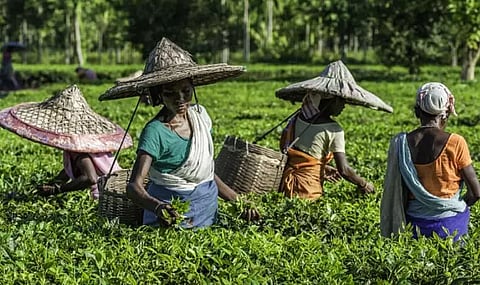
- Home
- Live Blog
- Breaking News
- Top Headlines
- Cities
- NE News
- Sentinel Media
- Sports
- Education
- Jobs

The ceremonial distribution of Rs 3,000 each to over 7.46 lakh tea plantation workers of Assam in Guwahati on Saturday by Union Finance Minister Nirmala Sitharaman has definitely signalled off a new era of welfare of tea workers of the state who had remained grossly neglected by successive governments, be it during the colonial era, or during the post-independence period. The story of tea workers of Assam in fact is a long story of displacement, exploitation and deprivation, beginning with the British planters since the Assam Company had brought in the first batch of poor uprooted tribals from the Chotanagpur Plateau in the sixth decade of the 19th century. The Indian planters who took to tea and later acquired most of the European companies were equally bad, if not worse, in exploiting the poor people, most of whom had remained illiterate and ill-fed for up to three or four generations. But then, while this huge population embraced Assam as their home and became inseparable from Assamese life, culture and economy, it is a fact that a small section from among them came out to join schools and later colleges, in the process becoming equal partners in public life of the state. While over 90 per cent of this population continue to remain engaged in tea plantations, a number of persons from the community have become public representatives, teachers as well as government officers. Three youths from the community have found a place in the latest batch of candidates selected by the Assam Public Service Commission.
There are three public representatives from the community in Parliament – two in Lok Sabha and one in Rajya Sabha – one of whom is a member of Modi's council of ministers. About five of them are also Members of the State Assembly. A prominent artiste from the community has recently found a place in the list of Padmashri awardees. What is most significant from the global point of view is that the people in most parts of the world wake up in the morning to have a cup of tea manufactured by the lakhs of hard-working people belonging to this community. As Sitharaman pointed out, Assam is known all over the world for its brand – tea, and while people start their mornings with a cup of Assam brew. Yet, the labourers who grow tea have been neglected for a long time making them live a disadvantaged life. While those at the helm of affairs in the past had mostly preferred to use or exploit them as vote banks, it is only since the Narendra Modi-led Central Government assumed power in 2014 that various measures for the uplift of the tea community have been taken up in right earnest.